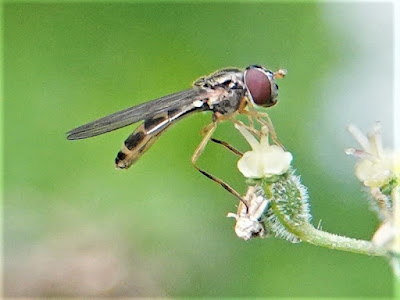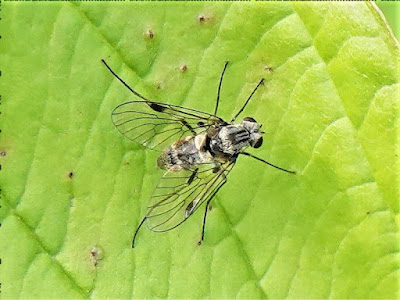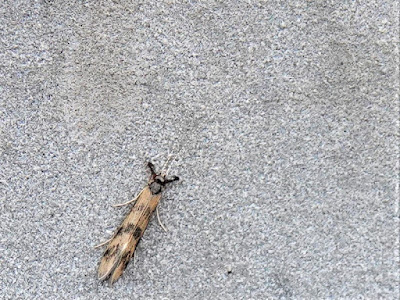11.0°C > 15.0°C: Mainly broken medium / high cloud with only a few sunny periods. A calm start with a light westerly breeze developing. Very good visibility.
Sunrise: 05:21 BST
* = a species photographed today
! = a new species for me here this year
!! = a new species for me in Shropshire
Priorslee Balancing Lake: 05:05 – 06:10 // 07:10 – 09:55
(162nd visit of the year)
Bird notes:
- all four Mute Swans remain.
- another increase in Coot numbers. Has the Winter build-up started? Or is it that they have all now emerged from their nest sites?
- 49 Jackdaws were counted outbound from wherever they roost c.05:40. The at c.08:10 two groups totalling 59 birds were circling over the dam area. My view was blocked and I could not determine which way they were going.
- only three House Martins noted: one of these was a begging juvenile.
Counts of birds noted flying over:
- 29 Canada Geese: 20 outbound in three groups; nine inbound together
- 73 Greylag Geese: 29 outbound in two groups; 44 inbound in two groups
- c.80 Racing Pigeons: together
- 198 Wood Pigeons
- 21 Lesser Black-backed Gulls
- 1 Cormorant: circled over checking the lake out but continued
- 108 Jackdaws
- 29 Rooks
- 1 Greenfinch
Hirundines etc. noted:
- 1 Barn Swallow
- 3 House Martins
Warblers noted (the figure in brackets relates to birds heard singing):
- 14 (2) Chiffchaffs
- 8 (1) Reed Warblers
- 1 (0) Blackcap
- 1 (1) Common Whitethroat
'nominal' warbler:
- 1 (0) Goldcrest
Counts from the lake area:
- 33 Canada Geese: eight remained from yesterday; four arrived and departed; another (?) four arrived; then 17 arrived
- 10 Greylag Geese: one remained from yesterday; a single arrived and then eight more
- 4 Mute Swans
- 22 (?♂) Mallard
- 7 adult and juvenile Moorhens
- 56 adult and juvenile Coots
- 7 + 1 (1 brood) Great Crested Grebes
- 25 Black-headed Gulls at most on the lake. 109 (1 juvenile) were on the football field at 05:55
- *1 Herring Gull
- 8 Lesser Black-backed Gulls on the lake, at various times: also two on the football field at 05:55
- 1 Grey Heron
- 1 Kingfisher
Noted on the street lamps poles pre-dawn:
Moths:
- *1 !Large Emerald Geometra papilionaria
- *1 Black Arches Lymantria monacha
- *1 !Large Emerald Geometra papilionaria
- *1 Black Arches Lymantria monacha
Spiders etc.:
- 1 harvestman Dicranopalpus ramosus/caudatus
Noted later:
- 1 harvestman Dicranopalpus ramosus/caudatus
Noted later:
Butterflies:
- Ringlet Aphantopus hyperantus
- Gatekeeper Pyronia tithonus
- Ringlet Aphantopus hyperantus
- Gatekeeper Pyronia tithonus
Moths:
- Straw Grass-moth Agriphila straminella [was Straw Grass-veneer]
- Shaded Broad-bar Scotopteryx chenopodiata
- Straw Grass-moth Agriphila straminella [was Straw Grass-veneer]
- Shaded Broad-bar Scotopteryx chenopodiata
Bees, wasps etc.:
- *Honey Bee Apis mellifera [European Dark Bee A. mellifera mellifera]
- Garden Bumblebee Bombus hortorum
- *Red-tailed Bumblebee Bombus lapidarius
- Common Carder Bee Bombus pascuorum
- *ichneumon probably a male Ichneumon stramentor
- *Honey Bee Apis mellifera [European Dark Bee A. mellifera mellifera]
- Garden Bumblebee Bombus hortorum
- *Red-tailed Bumblebee Bombus lapidarius
- Common Carder Bee Bombus pascuorum
- *ichneumon probably a male Ichneumon stramentor
Hoverflies:
The first name is that used by Stephen Falk. The name in square brackets is that given by Obsidentify or other sources if different. Scientific names are normally common. The species are presented in alphabetic order of those scientific names.
- *Parsley Blacklet Cheilosia pagana
- *unidentified Cheilosia sp., just perhaps Yarrow Blacklet C. vulpina
- Marmalade Hoverfly Episyrphus balteatus
- Common Dronefly Eristalis tenax
- *Short Melanostoma Melanostoma mellinum [Variable Duskyface]
- *Chequered Hoverfly Melanostoma scalare [Long-winged Duskyface]
- *Dead-head Hoverfly Myathropa florea [Common Batman Fly]
- *Parsley Blacklet Cheilosia pagana
- *unidentified Cheilosia sp., just perhaps Yarrow Blacklet C. vulpina
- Marmalade Hoverfly Episyrphus balteatus
- Common Dronefly Eristalis tenax
- *Short Melanostoma Melanostoma mellinum [Variable Duskyface]
- *Chequered Hoverfly Melanostoma scalare [Long-winged Duskyface]
- *Dead-head Hoverfly Myathropa florea [Common Batman Fly]
Damsel-/dragon-flies:
- Brown Hawker Aeshna grandis
- Common Blue Damselfly Enallagma cyathigerum
- Brown Hawker Aeshna grandis
- Common Blue Damselfly Enallagma cyathigerum
Other flies:
- *Black Snipefly Chrysopilus cristatus
- *probable Common Green Bottle Fly Lucilia sericata
- *Grouse Wing caddis fly Mystacides longicornis
- *cluster fly Pollenia rudis
- *flesh fly Sarcophaga carnaria or similar
**otherwise only unidentified flies noted
- *Black Snipefly Chrysopilus cristatus
- *probable Common Green Bottle Fly Lucilia sericata
- *Grouse Wing caddis fly Mystacides longicornis
- *cluster fly Pollenia rudis
- *flesh fly Sarcophaga carnaria or similar
**otherwise only unidentified flies noted
Bugs etc.:
- *Red Bug Deraeocoris ruber
- *Mirid bug Lygus pratensis or similar
- *Red Bug Deraeocoris ruber
- *Mirid bug Lygus pratensis or similar
Beetles:
- Common Red Soldier Beetle Rhagonycha fulva
- Common Red Soldier Beetle Rhagonycha fulva
Molluscs:
- *White-lipped Snail Cepaea hortensis
- *White-lipped Snail Cepaea hortensis
Fungus:
- *possible Stubble Rosegill Volvariella gloiocephala
- *possible Stubble Rosegill Volvariella gloiocephala
This morning's sunrise. A touch of mist. More cloud later.
This does not help much. I think Yellow-legged Gull would show a paler head.
One of the local Common Buzzards flies to a perch in the Ricoh area...
A new moth for the year. It is a Large Emerald Geometra papilionaria. I record one most years: this is my latest date for doing so.
A stunning moth: a different individual from that seen yesterday. A Black Arches Lymantria monacha.
A Honey Bee Apis mellifera. I cannot say I have noticed the thick rear leg on this species, perhaps because it is often covered by the pollen in the pollen sac. It seems this is also called the European Dark Bee with the scientific trinomial A. mellifera mellifera.
A Red-tailed Bumblebee Bombus lapidarius sleeping in the Ragwort.
This ichneumon is probably a male Ichneumon stramentor. There are several similar species.
A Short Melanostoma hoverfly Melanostoma mellinum.
The thoracic markings on this Dead-head Hoverfly Myathropa florea are rather indistinct.
A female Black Snipefly Chrysopilus cristatus. The species name is not appropriate for the female.
Probably the Common Green Bottle Fly Lucilia sericata.
A Grouse Wing caddis fly Mystacides longicornis. Just about visible is the long, banded antennae.
This fly was making forays from the buttercup petal. I tried a new ID app – Google Lens – to give me the identity as the cluster fly Pollenia rudis. Obsidentify agreed it was a cluster fly but went no further.
A flesh fly Sarcophaga carnaria or one of several similar species.
A Red Bug Deraeocoris ruber. Seems a good name.
A bug in the hand is worth....
Obsidentify thought this fungus most likely a Stubble Rosegill Volvariella gloiocephala. I am in no position to argue!
(Ed Wilson)
In the Priorslee Avenue tunnel:
(Ed Wilson)
------------------------------------------------------------------------------------------------------
In the Priorslee Avenue tunnel:
Flies:
- *1 cranefly possibly Tipula lateralis
- *1 cranefly possibly Tipula lateralis
Other things:
- 6 White-legged Snake Millipede Tachypodoiulus niger
- 6 White-legged Snake Millipede Tachypodoiulus niger
This cranefly is possibly Tipula lateralis. I could not get angle to see the wing pattern to clinch the identification.
(Ed Wilson)
The Flash: 06:15 – 07:05
(Ed Wilson)
------------------------------------------------------------------------------------------------------
The Flash: 06:15 – 07:05
(165th visit of the year)
Bird notes:
- the Mallard were having another hiding day.
Bird(s) noted flying over here:
- 1 Herring Gull
- 4 Jackdaws
Hirundines etc. noted:
- 6 House Martins
Warblers noted (the figure in brackets relates to birds heard singing):
- 6 (1) Chiffchaffs
- no Blackcaps
'nominal' warbler:
- 1 (0) Goldcrest
Noted on / around the water:
- 49 Canada Geese
- 9 Greylag Geese
- 2 + 3 (1 brood) Mute Swan
- 13 (?♂) Mallard
- 30 (?♂) Tufted Duck
- 9 + 1 (1 brood) Moorhens
- 47 + 5 (3 broods) Coots
- 6 Great Crested Grebes
- 2 Black-headed Gulls
Noted elsewhere around The Flash:
Moths:
- 1 Straw Grass-moth Agriphila straminella [was Straw Grass-veneer]
- *1 Riband Wave Idaea aversata
- 1 Straw Grass-moth Agriphila straminella [was Straw Grass-veneer]
- *1 Riband Wave Idaea aversata
Bees, wasps etc.:
- 1 Common Wasp Paravespula vulgaris
- 1 Common Wasp Paravespula vulgaris
Beetles:
- *1 Orange Ladybird Halyzia sedecimguttata
- *1 Orange Ladybird Halyzia sedecimguttata
By far the best specimen of a Riband Wave Idaea aversata I have seen this year. Again of the form remutata where the area between the outer cross lines is not solid colour.
Tucked up in the crease of a street lamp pole I found this Orange Ladybird Halyzia sedecimguttata.
(Ed Wilson)
------------------------------------------------------------------------------------------------------
Sightings from previous years
2006
Priorslee Lake
Redshank
(Ed Wilson)



























